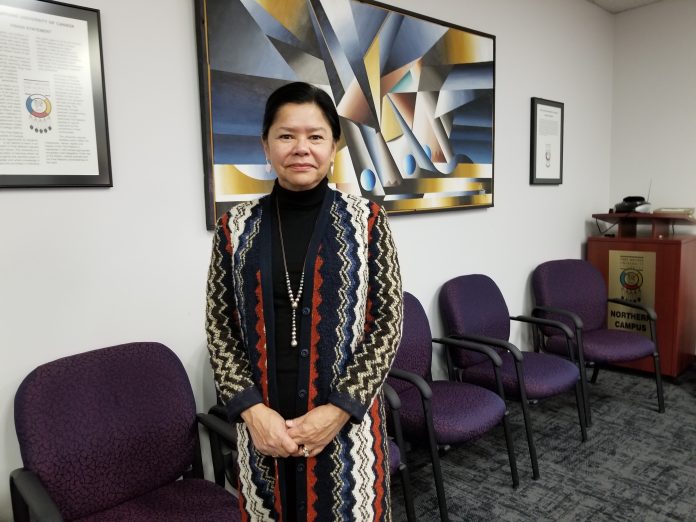
First Nations University of Canada (FNUniv) President Jackie Ottmann said she’s disappointed by Infrastructure Canada’s decision to turn down the university’s funding request for a new Prince Albert campus, but they aren’t giving up.
Ottmann was in Prince Albert on Friday just days after Infrastructure Canada declined FNUniv’s
$25 funding request made through the Green and Inclusive Community Buildings (GICB) Program. If successful, the funds would have gone towards constructing a new campus near the Alfred Jenkins Field House.
“We put a lot of time and effort and expense into presenting Infrastructure Canada with a strong proposal for a new campus here in Prince Albert, for First Nations University of Canada, so I was disappointed because we had every indication that it was a strong submission,” Ottmann said.
“We’re not giving up. We still will work with the governments to seek solutions.”
One of those solutions will be to step up their fundraising campaign. FNUniv already had plans to raise $5.5 million in donations. Ottmann said they’ll likely increase that number. Leadership is still discussing other potential fundraising avenues.
This was the FNUniv’s second submission to the GICB program. Ottmann said she’s not sure if there’s going to be another.
Even if there was, FNUniv isn’t sure if the proposal needs changing since they received no feedback from Infrastructure Canada. The project is shovel ready after the City of Prince Albert sold FNUniv the land for $1 in January 2023, but Ottmann said it’s not clear what, if anything, needs changing in their proposal.
“There was no feedback,” she said. “It was a fairly generic response.”
When asked why Infrastructure Canada denied the request, a representative wrote that they do not share details on individual funding applications to ensure partner confidentiality. The representative wrote that all projects are assessed according to eligibility and merit-based, and Infrastructure Canada works with each applicant to identify their needs.
“There was a very high level of demand for funding under the Green and Inclusive Community Buildings Fund, and unfortunately not all submissions were able to receive funding,” reads the email.
“The Government of Canada is committed to closing the infrastructure gap between Indigenous and non-Indigenous communities, and we will continue to work with our partners across the country to support infrastructure projects that improve affordability, advance climate goals, and enhance the services and programs that residents rely on.”
Despite the setback, the project still has strong support among Indigenous leadership. Ottmann met with PAGC Grand Chief Brian Hardlotte and another PAGC chief while at the FSIN assembly earlier this week. They plan to meet again to discuss the next steps.
“The leaders of our 12 member nations are unanimously committed, highlighting our determination to complete this project,” Hardlotte said in a press release. “While this most recent funding bid may not have been successful, we are certain that both levels of government will recognize will recognize the immense value and importance of a new FNUniv Northern Campus.”
The project gained more support at the FSIN Winter Session of the Legislative Assembly on Feb. 27-28, when the chiefs passed a resolution endorsing campus construction in Prince Albert.
“This campus is more than a building,” FSIN Chief Bobby Cameron said in a press release. “It is an investment in our youth, our culture, and our future. This campus is envisioned as a hub for Indigenous scholarship, reflecting our commitment to education as a means of sustaining our culture and communities. We urge federal decision-makers to act swiftly in funding this critical initiative.”
The FNUniv Prince Albert campus has seen steady growth in the past few years. They now have more than 300 students enrolled in nine programs.
Ottmann said the current downtown campus is too small. Without a new facility, they will struggle to add more students and programs. Ideally, the university wants to expand their science and tech offerings.
“This has been a longstanding desire for the students and the Indigenous community in the north, to have a facility that’s dedicated to post-secondary education,” Ottmann said. “Grand Chief Hardlotte shared with us earlier this week that this desire has been on the minds of people in this community and north for approximately 30 years, and we’ve been located, First Nations University of Canada has been located in Prince Albert for over 20 years, so we’re well overdue.”

